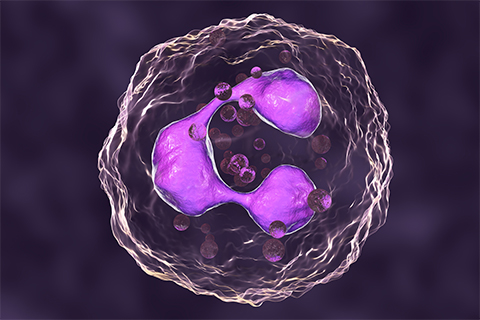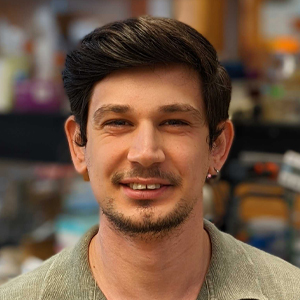Probing for a ketone body’s link to age-related inflammation
Glucose levels in the blood and cells are regulated by the pancreatic hormones insulin and glucagon. While insulin helps cells to take in glucose and reduces blood glucose levels, glucagon initiates the conversion of stored glycogen to glucose.
When glucose is depleted, insulin levels decrease but glucagon levels remain stable. In cells, this triggers the release of fats, which are converted into different types of ketone bodies by the enzyme 3-Hydroxy-3-methylglutaryl-CoA, or HMGCL, in the liver. One of these ketone bodies, beta-hydroxybutyrate, or BHB, can be an energy source for the brain and skeletal muscle when blood glucose is low. Several studies have also shown that BHB also plays a role in the signaling pathways of lipolysis and aging.

Emily Goldberg, a researcher at the University of California, San Francisco, studies NOD-, LRR- and pyrin domain-containing protein 3, known as NLRP3, and how this protein interacts with BHB. NLRP3 helps to regulate the innate immune system and inflammatory signaling as well as age-related inflammation.
“We had previously shown that the NLRP3 drives age-related inflammation and that the ketone body BHB inhibits NLRP3 activation in macrophages and neutrophils, so we hypothesized that BHB might inhibit age-related inflammation,” Goldberg said.
Although most ketone bodies are produced in liver cells, researchers hypothesize that they also can be synthesized by cells from other tissues, including macrophages and neutrophils.
To test their hypothesis about BHB, Goldberg and a team of researchers from UCSF and the Yale School of Medicine used mice from which they deleted the gene that encodes the HMGCL enzyme. This helped them prevent ketone body synthesis in specific cell types, namely macrophages and neutrophils.
“Making the mice to test this hypothesis and planning the experiments to have enough aged mice was the most difficult part of the study,” Goldberg said.
The team compared the role of liver-based ketone body formation with that of cell-specific ketone body formation in age-related inflammation.
In their recent paper published in the Journal of Biological Chemistry, the researchers point out that the liver is the only organ that can produce enough ketone bodies to maintain blood glucose levels, and neutrophil-based ketogenesis does not regulate age-related metabolic health.
“Exogenous ketones are likely responsible for controlling innate immune inflammation in aging,” Goldberg said, “Macrophages can metabolize acetoacetate, but not BHB and this is important for their function. But why innate immune cells take up BHB remains unclear.”
The group only used a single mouse strain; using other strains and different mutations in different enzymes in the ketone body formation pathway could show different results. Goldberg said that next they will consider all these limitations and aim to determine why innate immune cells take up BHB.
Enjoy reading ASBMB Today?
Become a member to receive the print edition four times a year and the digital edition monthly.
Learn moreGet the latest from ASBMB Today
Enter your email address, and we’ll send you a weekly email with recent articles, interviews and more.
Latest in Science
Science highlights or most popular articles

Redefining lipid biology from droplets to ferroptosis
James Olzmann will receive the ASBMB Avanti Award in Lipids at the ASBMB Annual Meeting, March 7–10, just outside of Washington, D.C.

Women’s health cannot leave rare diseases behind
A physician living with lymphangioleiomyomatosis and a basic scientist explain why patient-driven, trial-ready research is essential to turning momentum into meaningful progress.

Life in four dimensions: When biology outpaces the brain
Nobel laureate Eric Betzig will discuss his research on information transfer in biology from proteins to organisms at the 2026 ASBMB Annual Meeting.

Fasting, fat and the molecular switches that keep us alive
Nutritional biochemist and JLR AE Sander Kersten has spent decades uncovering how the body adapts to fasting. His discoveries on lipid metabolism and gene regulation reveal how our ancient survival mechanisms may hold keys to modern metabolic health.

Redefining excellence to drive equity and innovation
Donita Brady will receive the ASBMB Ruth Kirschstein Award for Maximizing Access in Science at the ASBMB Annual Meeting, March 7–10, just outside of Washington, D.C.

Mining microbes for rare earth solutions
Joseph Cotruvo, Jr., will receive the ASBMB Mildred Cohn Young Investigator Award at the ASBMB Annual Meeting, March 7–10, just outside of Washington, D.C.

